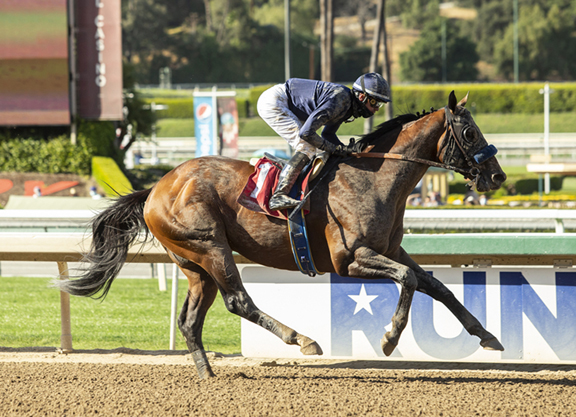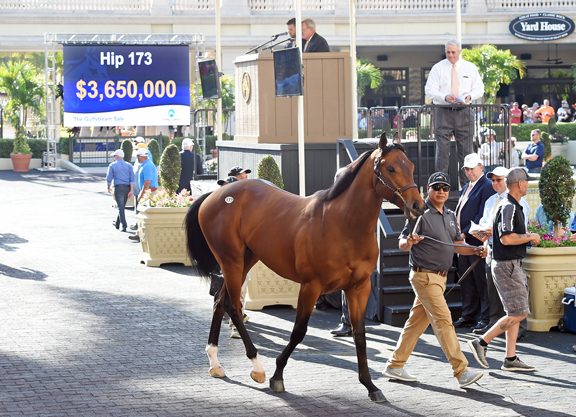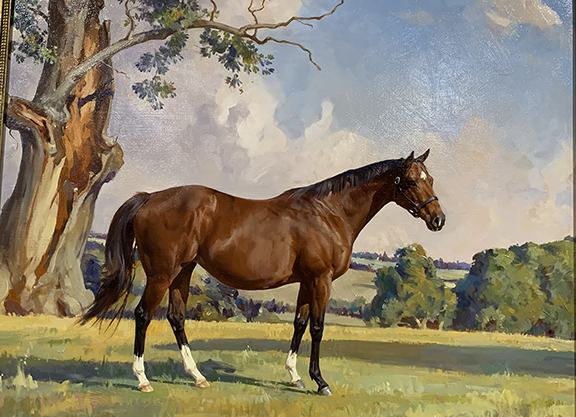By Chris McGrath
While it remains too early to acclaim a masterpiece in the making, even these first, bold brushstrokes have plainly been mixed from an unusually vivid genetic palette. And if Cezanne (Curlin) can complete the canvas the way he has started, with a confident new flourish in the GIII Kona Gold S. last weekend, then he could become an exhibit for one of the principal galleries of the modern breed.
Happily it has the most discerning of curators in John Sikura, who has been devotedly cultivating this family–Cezanne's third dam is the celebrated Better Than Honour (Deputy Minister)–since the turn of the century. Sikura's Hill 'n' Dale Farm co-bred Cezanne with St. Elias Stable, whose owner Vinnie Viola retained a stake alongside the Coolmore partners when the colt topped the Gulfstream Sale of 2019 at $3.65 million.
Poignantly, that proved to be the parting bow of Viola's great friend Jimmy Crupi, who passed away shortly after preparing Cezanne for the sale. And the horse who hurtled :10 flat that week himself appeared to go into mourning, not making his debut for Bob Baffert for over a year. His first couple of starts proved worth the wait, but after apparently failing to cope with a rise in grade he disappeared again until resurfacing at Santa Anita last Sunday. His performance there suggests that he is now poised to make up for lost time for a family tree that has already blossomed anew this spring through Greatest Honour (Tapit), a grandson of Better Than Honour who retains potential to top the crop despite unfortunately sitting out the Derby.
Cezanne is trying to become one of those horses that makes sense of the way an entire industry strives for viability. He represents principles that need to work out sufficiently often to maintain investment at the highest level, even if it's no less important that other successes appear less accountable. For Sikura (with various partners along the way) has ensured that this royal line has been seeded by the very best broodmare sires: Cezanne is out of a Bernardini mare, herself out of a daughter of Storm Cat. And Better Than Honour's sire, the legendary distaff influence Deputy Minister, is also the damsire of Curlin. As Sikura puts it: “Sort of molasses on top of sugar on top of an artificial sweetener. About as rich as you can make it.”
Sikura's original engagement with this family, buying and selling Better Than Honour twice over, is not just familiar but outright historic. First time, she soon passed through his hands: a private purchase from Robert Waxman, in whose silks she had won a Grade II, she was sold on to the Gumberg family's Skara Glen Stables with the proviso that if her first foal proved to be a filly, Sikura would keep her. That proved a turning point, as Better Than Honour delivered a daughter by Storm Cat.
Though she did not make the track until four, Teeming won all three starts after her debut. “She was wonderfully talented, but unsound,” remembers Sikura. “She had superstar ability, and just a magnetic personality: beautiful face, well-made, just an exquisite creature.”
And, as it would turn out, she also had a useful propensity to deliver fillies. But meanwhile her mother was busy upgrading the pedigree, famously giving us consecutive GI Belmont S. winners in Jazil (Seeking the Gold) and Rags to Riches (A.P. Indy) to emulate her own granddam Best in Show (Traffic Judge) as a Broodmare of the Year. So when Mike Moreno of Southern Equine partnered with Sikura, with a brief to seek the best possible mares, their first purchase was Better Than Honour. At that stage, Rags to Riches had been beaten on her solitary juvenile start. By the time the partnership was dissolved, in 2008, Better Than Honour had made herself worth $14 million, a broodmare auction record, for Moreno to buy out Sikura.
Remarkably, Teeming turned out seven winning fillies, most notably Streaming (Smart Strike) who won the GI Hollywood Starlet S. One day Viola enquired if there might be any access into the dynasty. “I don't sell that family,” Sikura replied. “But if I ever do, I'll call you.”
Viola's chance came through Teeming's second daughter, a maiden winner by Bernardini named Achieving. Sikura had raced her in partnership with the late James A. Sapara of Winsong Farm, Alberta, whose share was originally acquired by George Prussin before ultimately being traded on to Viola. By that stage she had three foals on the track, two of them black-type winners including Arabian Hope (Distorted Humor), Group I-placed over a mile in Europe for Godolphin. Viola's esteem for Curlin is well known, so fortunately the mare had a repeat date with Hill 'n' Dale's top gun after delivering Cezanne. The resulting full-sister, now in Florida preparing to join Todd Pletcher, became all the more precious after the premature loss of Achieving.

Curlin at Hill 'n' Dale | Sarah Andrew
“She colicked, it was tragic,” Sikura said. “But you know in this business things won't always follow your plan. My son said, 'Dad, how come only the good horses die?' I said, 'I guess our goal is to be surrounded by good horses. So that means anytime something will go on, it will be an enormous loss.' Of course, equine life is always precious. But when you have a unique, special, one-off type of animal, it makes it even harder. But that's the business, I'm sad to say. And things go on.”
They sure did, with Cezanne–albeit for a while that didn't seem terribly likely. They put him in the September Sale as a yearling. He was very correct, but a touch plain and they never could work off a bit of girth.
Viola came to the barn on the day of the sale and asked: “How are we doing?”
“We don't have anybody,” Sikura replied. “There's been no scoping. Had people look, but I don't think he's going to get sold.”
They agreed not to put him through the ring but to send him down to Crupi in Florida, and the rest is history. That's what Sikura is hoping, anyway, because he makes it a rule not to ask about horses he has sold–especially at that kind of money. “Because if they're good, it's common knowledge,” he says wryly. “And, if they're no good or something went wrong, you hate to put someone on the spot.”
So while he doesn't know quite what it was that interrupted Cezanne's career, he is gratified to see him thriving now for a team for whom he has the utmost regard.
“It was great he sold so well,” Sikura says. “But as important, for you to continue to restock and be in business, is that those horses are successful for the new owners. He has certainly shown that he has brilliant ability and now it's up to the racing gods. But he's in the hands of a master, he's owned by the smartest horsemen in the world, and it's a wonderful family–one of the few international pedigrees that performs in America, that performs in Europe, and at the highest level. Coolmore know the quality of that family [Better Than Honour's half-sister was dam of their champion Peeping Fawn (Danehill)]. So it's worked for them, and it's worked for us. We've had many daughters and I hope it will continue to proliferate, so that you end up with only one dam on the page and that's it.”
Admittedly Cezanne hasn't necessarily jumped through quite the expected hoops to this point. He was bought as a ready-to-roll flying machine who also had a Classic, two-turn page. Two years later, he has just made his fourth start, and in a sprint. It may be that Baffert just didn't want to stretch him on his comeback and, having pounced off an obligingly wild pace at Santa Anita, Cezanne may yet be restored to a second turn. That can be left to the seasoned judgement of his trainer and ownership group. All that really matters is that he bears the family hallmark.
Which is what, exactly? “There's randomness in all genetics, but there seems to be less here,” Sikura says. “It's a richness of blood that doesn't seem to wane, doesn't water down. It doesn't skip a generation. The transmission of quality is just so consistent. It's a rarity, but every once in a while, mares do that.”
Sikura suspects that such mares were slightly less uncommon in the past. (If he's right, then maybe that's something to do with the loosening of quality inevitable in modern stallion books: in times past, only the most eligible mares deserved access to top sires.) Regardless, he looks at the way Courtly Dee and her daughters were managed, and dares to dream of a similar legacy someday–“where one becomes two, becomes five, and then you've got 10, 12 daughters, granddaughters, great-granddaughters, all providing racehorses with relevancy today, tomorrow, and yesterday.”
If anything, Sikura felt that the family had fallen a little dormant over the past couple of years. But his expectations never wavered, and he has retained fillies from different branches so that he can control his own destiny, can keep that quality tight: a War Front here, a Candy Ride (Arg) there. But he's delighted, of course, that the line should have been newly invigorated by his own farm's premier stallion.
“It's very rewarding to breed a good horse, to see another generation come through under your care,” Sikura says. “You try with all of them, but only sometimes are you lucky enough to have the right vine, that outperforms the other vines. I guess that's what makes Chateau Lafite, and that's also what makes great dynasties in cattle or hunting dogs. Every once in a while, there seems to be such a concentration of genetic stuff that the fault lines are very thin. The expectation, the commonplace, is excellence and superiority–whereas in virtually every other mare, it's happenstance.
“In Better Than Honour and through Teeming and her daughters, greatness always seemed imminent. The family produces unfiltered quality so reliably they are generational influencers on the breed. Supreme quality and prepotency that only the rarest of families beget are hallmarks of this page. The fact that Greatest Honour and Cezanne emerged this year is a reminder of the relevancy and influence of this family each generation from Blush With Pride, Better Than Honour, Teeming and now Achieving.”
But you can't be in a hurry for that stuff. Even in the brief span of Cezanne's adolescence, after all, there has been a repeated need for patience.
“I remember saying how we had no action on this horse, and then all of a sudden he was the wild talking horse at Gulfstream,” says Sikura. “So well done to everybody. He's well owned, he's well trained, he's well bred. I don't see any deficit in the horse. I hope the sky's the limit.
“It's nice when you have a deal where genuinely everybody prospers, where everybody benefits and shares in the reward. It doesn't happen that often, there aren't that many opportunities, but this I believe is a deal that is giving back to everybody. They were brave to buy him and hopefully they're going to be rewarded with a blue-blooded stud prospect that has achieved on the racetrack.”
Aptly enough, a precious contributor to this tale has been actually rendered in paint. With eerie timing, as though anticipating both the imminent disaster and the consolations that would follow, Sikura for the first time decided to commission a portrait of one of his mares. Just days after Andre Pater came out for an initial study, Teeming was dead. (She suffered complications after twisting a gut.) Pater had wanted to pose her against a tree and Sikura requested that it should unobtrusively extend a dead limb with seven new sprouts.
“Nobody will see it or know it, but I will and that will represent the seven daughters,” he explains. “So there's the rejuvenation, the rebirth. Even now when I think of the day she died, I just hit bottom. But if there wasn't so much bad in this business, the good wouldn't feel as good.”
And, by the same token, greatness seldom comes our way. “It has to be so rare that people think, are you sure it can happen?” says Sikura. “And then, just when you don't think it can happen anymore, it does happen. It's frustrating along the way, but it's much like with the Triple Crown. People said you have to change dates, it doesn't work this way, it doesn't work that way. And then here come two Triple Crown winners, including one that didn't run as a 2-year-old, which was an impossibility.”
Yet however rare, greatness can have a clockwork quality, too. With Best in Show a Broodmare of the Year, and her granddaughter the same, how about a granddaughter of Better Than Honour someday following suit?
“That would just be history-making,” Sikura says. “That would be something that would last forever. You wouldn't want it for personal accolade, or to say 'look what we've done.' It would be for the family; it would be to recognize something that is going to be there for eternity, as one of the unique mares of the Stud Book. You could only dream of that happening. But the possibility is there.”
Not a subscriber? Click here to sign up for the daily PDF or alerts.









